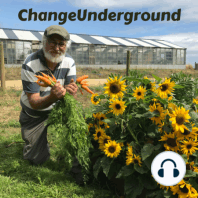7 min listen

152. Regen Ag from Manitoba to Berlin Via an Irish Sojourn | #worldorganicnews 2019 01 21
152. Regen Ag from Manitoba to Berlin Via an Irish Sojourn | #worldorganicnews 2019 01 21
ratings:
Length:
8 minutes
Released:
Jan 20, 2019
Format:
Podcast episode
Description
LINKS PODCASTING CHECKLISTS CLICK HERE Transcript: Facebook Page: World Organic News Facebook page. WORLD ORGANIC NEWS No Dig Gardening Book: Click here Highclere Smallholding Blog: Click here Permaculture Plus http://permacultureplus.com.au/ Topical Talks Regenerative agriculture creates a sprawling road map https://www.manitobacooperator.ca/news-opinion/news/regenerative-agriculture-creates-a-sprawling-road-map/ Thousands of farmers, supporters take to streets in Germany demanding climate-friendly agriculture https://www.cnbc.com/amp/2019/01/19/thousands-take-to-streets-in-germany-for-climate-friendly-agriculture.html Regen Ag from Manitoba to Berlin Via an Irish Sojourn. This is the World Organic News for the week ending the 21st of January 2019. Jon Moore reporting! Decarbonise the air, recarbonise the soil! A little housekeeping. Some of you have noticed the website is down. I’m discussions with my host about appropriate levels of performance and hope it will be back up soon. In the meantime I’m posting things to the Facebook page if you’re interested. And now to the show. This week we look at some of the faces of regenerative agriculture. From the Manitoba Co-operator a piece entitled: Regenerative agriculture creates a sprawling road map. Quote: Regenerative agriculture has got lots of time in the headlines, but the movement may look very different for an organic farmer with 3,000 acres of annual crops versus a rancher whose land is mostly pasture. End Quote As we can all agree, I think, every piece of land is different, every person will have different vision for their particular piece of land and if we toss in the variability of the weather, different approaches are critical. Whether grazing, cropping, horticulturing (?) or a combination of these, flexibility and the ability to pivot are skills we need. An example will illustrate. Last Northern Summer I observed a 100 acre organic farm in East Cork, Ireland coming to terms with a drought. The last time this occurred with the mid 1970s. There was, therefore, not much institutional memory of what to do in these circumstances. On nearby properties I saw potato paddocks of 20 acres and a single sprinkler with a spread of twenty metres in the middle of the field. It was a pointless but heroic effort. The country itself is not equipped for drought. The image of Ireland as a green paradise is there for a reason. The amount of bare soil became an issue. This was especially so in the outdoor horticultural parts of the farm. Eventually the rain returned but the deficit was obvious. The pastured based sections of the farm were rotated through more quickly than usual as the feed had stopped growing. The grain part of the farm fared best. The barley was well underway before the rains stopped arriving and the soil had a fair amount of moisture from a late finishing winter with an unusually heavy snowfall. The challenges for each section of the enterprise were, therefore, different. This brings us back to the Manitoba Co-operator piece: Quote: Blain Hjertaas of Redvers, Sask., and David Rourke of Minto, Man., were both well-known faces before their panel at the MFGA Regenerative Agriculture Conference in Brandon late last November. For Hjertaas, it’s all about livestock. The longtime beef producer and holistic management instructor counts pasture as a good portion of his land base. He has become a passionate advocate for planned grazing, often called to conferences and workshops to share his experiences with high-density rotational grazing and the benefits he’s seen in his soil organic matter, sequestered carbon, forage yields and pasture performance. But high stock density grazing, with its small paddocks and frequent herd movements, also seems like a long reach for farmers like Rourke, whose operation revolves around annual crops and who has no livestock of his own. Instead, Rourke’s experience with regenerative agriculture slan
Released:
Jan 20, 2019
Format:
Podcast episode
Titles in the series (100)
23 #worldorganicnews 2016 07 04: A new documentary "What's With Wheat?", Industria… by ChangeUnderground